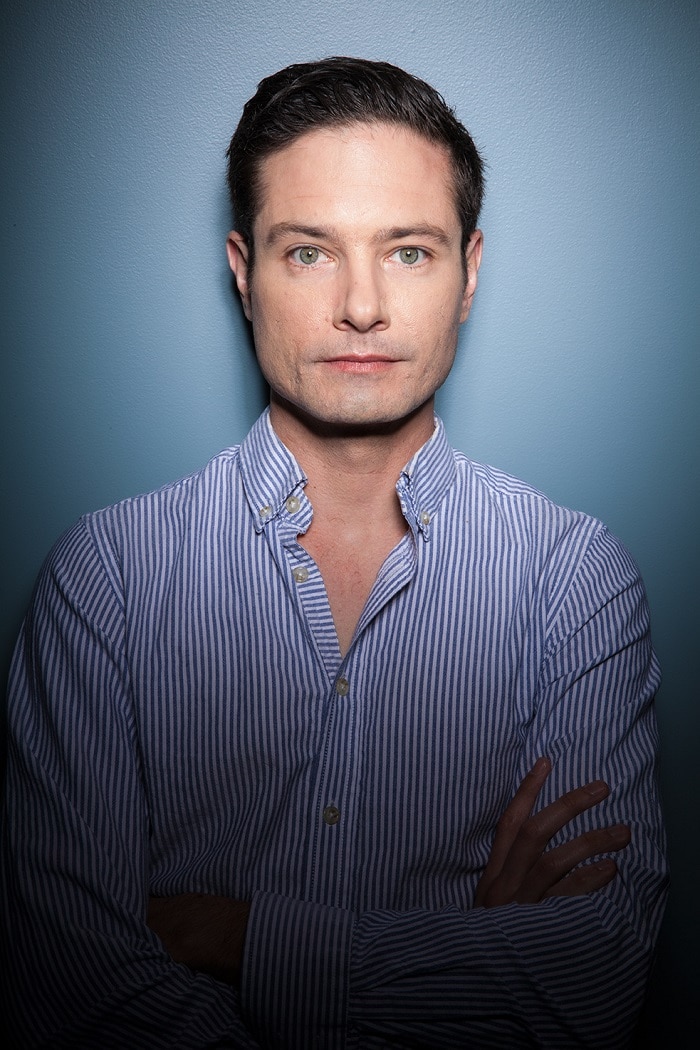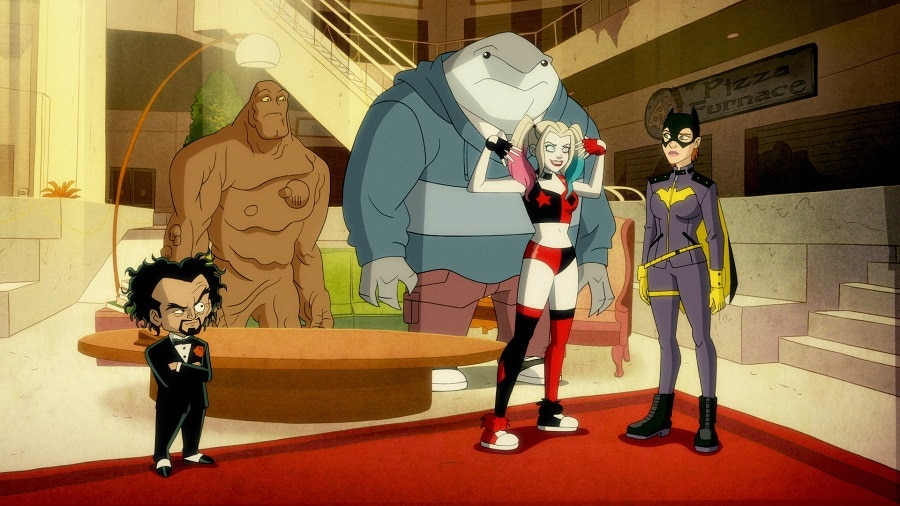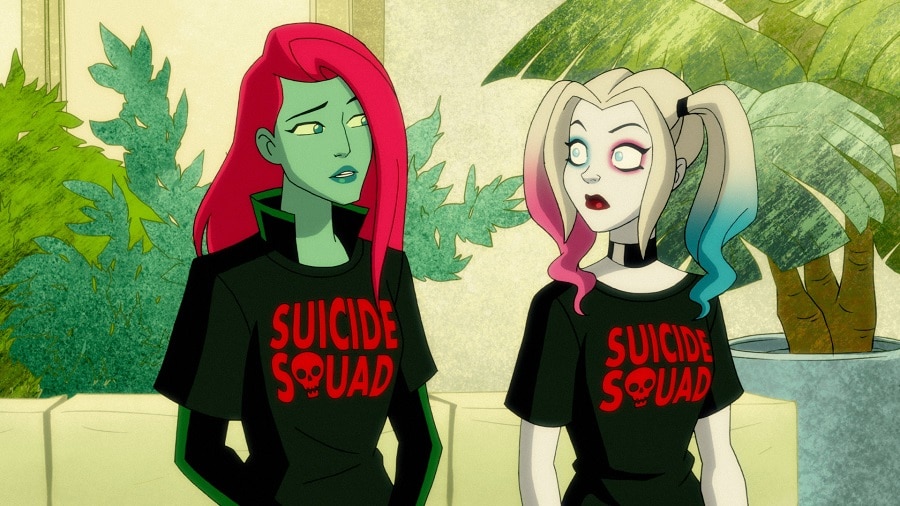With Harley Quinn, it doesn’t pay to go subtle. Or rather, it doesn’t usually. However, as fans of Harley’s spectacular animated series could tell you, Ms. Quinn has some real depth, nuance and gentleness to her in between all of her over-the-top super-villain hijinks and baseball bats to the heads. Which means, if you give the Harley Quinn soundtrack a spin thinking it’s going to be all guitar riffs and bombast, you’re in for a surprise. While there are certainly songs that are perfect for chaos-fueled carnivals and Gotham City mischief, there are also moments designed to pluck at your heartstrings—and all of them come care of composer Jefferson Friedman.
Friedman’s had an expansive career that began in New York City in the realm of classical composition before shifting into film and TV scoring, and he’s likely had to lean on the full spectrum of his experience while creating the music for DC’s wildest animated foray. With Harley Quinn, he’s had to compose for just about every crazy figure in the Bat-Universe, from central characters Harley and Poison Ivy, to B-listers like Clayface and King Shark, to classic heroes and villains like Batman and the Joker, to…well, Kite Man. That the score still manages to sound amazingly cohesive and tight in spite of all this attests to just what a remarkable job Friedman has done here.
With more and more viewers discovering Harley Quinn now that it’s on HBO Max and with Batman Day arriving this weekend, it seemed like the perfect time to chat with Friedman about his work on the Harley Quinn soundtrack and how it feels writing music for such a beloved character. In the process, Friedman discussed his philosophy on electronic scoring, shared how the “Harlivy” theme came together and revealed the surprising story behind those end credits dog barks.

Harley Quinn’s a pretty wild show, and I think the score reflects that. Was there any sort of music you looked to for influence when you learned you’d be scoring the series?
I had the rare opportunity on Harley to have all genres of music on the table. My shop was the entire music department, so every stitch of music you hear on the show, from the elevator music inside Harley’s brain to the montage songs to the heist music to each character’s theme, was custom-made for the show. Pat Schumacker and Justin Halpern (Harley Quinn’s showrunners) are on record saying you can interpret the show as Gotham through Harley’s eyes, so I tried to make all the music skewed or amped up in some way, to reflect Harley’s bonkers side. But to answer your question specifically, the first thing I did after our first meeting was put together a playlist of badass women musicians (from Hildegard von Bingen to Yoko Ono to Björk to Missy Elliott) and listened exclusively to it for like a month.
One other notable thing about my process for Harley is that I self-imposed a moratorium on any music made for a DC property while I was working on it. I had seen basically everything DC from the 1960s Batman series forward (I’m a fan!), but my idea was that if, for example, I wanted to add something worthy and unique to the canon of Batman themes, I wanted only some abstracted memory of all his great themes over the years to inform what I wrote.
Unlike most DC projects, Harley Quinn seems to involve nearly every DC hero and villain out there. Is there one you’ve particularly enjoyed writing music for?
It’s such an honor and truly a joy to be able to write themes for all these huge, mythic characters. Comic books are the mythology of our time, and to be able, in some small way, to help shape and contribute to the formation of these new gods and demigods is a special opportunity and a responsibility I take very seriously. When all is said and done though, I think Ivy’s theme is the one I’m proudest of (and was the hardest to figure out of all!).

I hear a lot of synth in the Harley Quinn score. Is it all electronic?
Depends on what you mean by electronic. Did almost everything other than guitars come from inside my computer? Yes. But the line between what is “real” and what is synthetic is becoming increasingly blurry. For example, “Please Don’t Go” is just strings and piano. I don’t own a piano. I do however own tons of virtual pianos that were created by sampling every note on some actual piano somewhere. And I sat down in front of my keyboard and it’s me playing that piano. Did I hire string players? I did not. But some violinist somewhere actually made the samples I used, and then it’s my job to “play” those samples. There are all sorts of ways to digitally manipulate the colors of these virtual instruments to make them expressive; making a version of them that sounds real (enough) and that tells an emotional story is part of the art of composing now.
One thing that’s pretty unique to Harley Quinn is the way that the show balances anarchic action and crass humor with genuinely tender and emotional moments. Your music for the series really reflects this. I’m curious, is it hard balancing those two extremes in the same score?
With every project I work on, I try to be as true to it as possible. My job is to help the showrunners tell their story, to give it more clarity and depth, to speed up or slow down the pacing, to add another dimension to character development. With Harley, I didn’t really have any choice other than to try and keep up with the breakneck storytelling. The show turns on dimes and so should the music. But also, I think part of what makes the show so great is that all these things bumping up against one another make the funny parts funnier and the violent parts sicker and the emotional moments more heartfelt and beautiful.
With “Harlivy” you’ve created a soundtrack to a relationship that has become especially important to fans. Did you know that was the direction the show was going in with season one? When did you start putting the Harley and Ivy theme together?
I honestly can’t remember when I found out they were going to eventually become more than friends, but I mean, come on, I think that story arc is set up and becomes pretty clear by the end of the first episode of season one. As to when I put the theme together, it was very early on, probably the second or third thing I wrote. I knew that Harlivy’s relationship (platonic or not) was going to be the main throughline of the show, but I also knew that Harley’s journey over the course of the first season was her self-emancipation from the Joker, and so if I made their love theme overtly romantic from the jump, it would be getting ahead of the story. (I did call it their love theme from day one though.)
I reined it in through instrumentation mostly; it’s so sparse—just a Rhodes electric piano, synth bass, an 808 kick, and some texture—it creates a gentle intimacy that’s non-committal about what kind of love it is. But when you write a theme and stick with it and use it to signify only one thing, it pays off, because then you can use it as a storytelling device later by changing something about it. For example, when Harley and Ivy are on the balcony in Themyscira, and their feelings for each other are clearly becoming more of a romantic love, I traded out the Rhodes for a piano and switched the texture out for orchestral strings, both of which tend to signify a deeper emotional feeling. And then of course I made a crazy epic version of it for their first kiss, because only love sets us free.
I also think Harley Quinn has one of the best end credits songs in all of animation. Can you talk about how “OOOH” came together? And were the dog barks always part of it?
Aw thx! Those end credits were the first thing I wrote for the entire show. It was important for me to come up with who Harley Quinn the character was musically, since she has the most gravity of any character in the show. (For superfans, I said “gravity” not “gravitas.”) Everything I wrote after it orbits around it in some way. There are SO many cues and themes that use some part of that dumb carnival punk song, whether the chord progression or the melody or the instrumentation and so on. It functioned like the canvas I wrote the rest of the music on. “Everyone into the Ice Vagina,” the Nutcracker-y Ice Capades scene, uses a variation of the chord progression; “Rise, Harley Quinn,” when she gains control of Darkseid’s parademon army, is just a straight-on full orchestra and chorus “cover” of “OOOH”…and I could go on and on.
The woofs were serendipitous in fact! We were doing the final mix of the first episode (well, actually, episode three was the first we did) and the credits rolled with the song, followed by Kaley’s “Yes, Norman” logo, complete with her woofs. I heard they were around the same tempo as the song and asked Pat and Justin whether I could try to make them part of the song and they indulged me. And musical rhythm is way more finicky than other things and so moving a sound one frame one way or the other isn’t granular enough, so I’m at the first mix asking our genius mixer George Peters to nudge the woofs a tiny bit one way and then the other and then back a little and forward again so that they sound like part of the song.
(Hey, it's Pat Schumacker. What Jefferson said is true. I was there to see it firsthand. One thing Jefferson left out was that George Peters is a genius not only for his sonic skills but also that he makes sure there's always a fresh batch of "Fuego" flavored Takis for Justin and me to much on during a particularly strenuous audio mix review, where we have to give notes like "I can't hear the characters talking because of Jefferson's music" or "For the love of all that is holy, please turn down Jefferson's music." Anyway, sorry to interrupt.)

You also wrote music for the DC sitcom Powerless. Would you like to take on a more traditional superhero show one of these days? Or do you prefer the sillier side of heroes?
Sure, of course! (To anyone making a DCEU tentpole movie, I’m available!)
It’s interesting, I had a very non-traditional path to writing for film and TV. I was a classical composer in New York City for twenty years, but I became disillusioned with the scene and needed to make a major career pivot to stay healthy. So, I picked up stakes and moved to LA. I thought what I had to offer this town was Very Serious Music for Very Serious Films, because that’s the only kind of music I had written before. But one project leads to another leads to another, and I ended up working on comedies, which turns out, I’m pretty good at! Powerless begat Harley, and I immediately felt at home writing for animation. My music takes up a lot of bandwidth at times, and with animation you have the luxury of making bigger and bolder musical gestures than you can with live action. I still think I have something to add to more serious stuff though (and currently I get to do that on New Amsterdam). Some of the emo stuff on Harley I think wouldn’t feel out of place in an indie movie, and I’d love to do that kind of work as well.
If you had to guess, what type of music do you think Harley Quinn enjoys?
Funny you should ask, I’m putting together a Harlivy playlist of what I think the two of them listen to when they’re hanging out at home together. It should be up on Spotify in a week or two!
Seasons 1 and 2 of Harley Quinn can be streamed on HBO Max and DC Universe. For more on the show, including articles, trailers and more, visit our official Harley Quinn page.
Stream, download or buy the Harley Quinn Season 1 and Season 2 Original TV Soundtracks by clicking here.




















